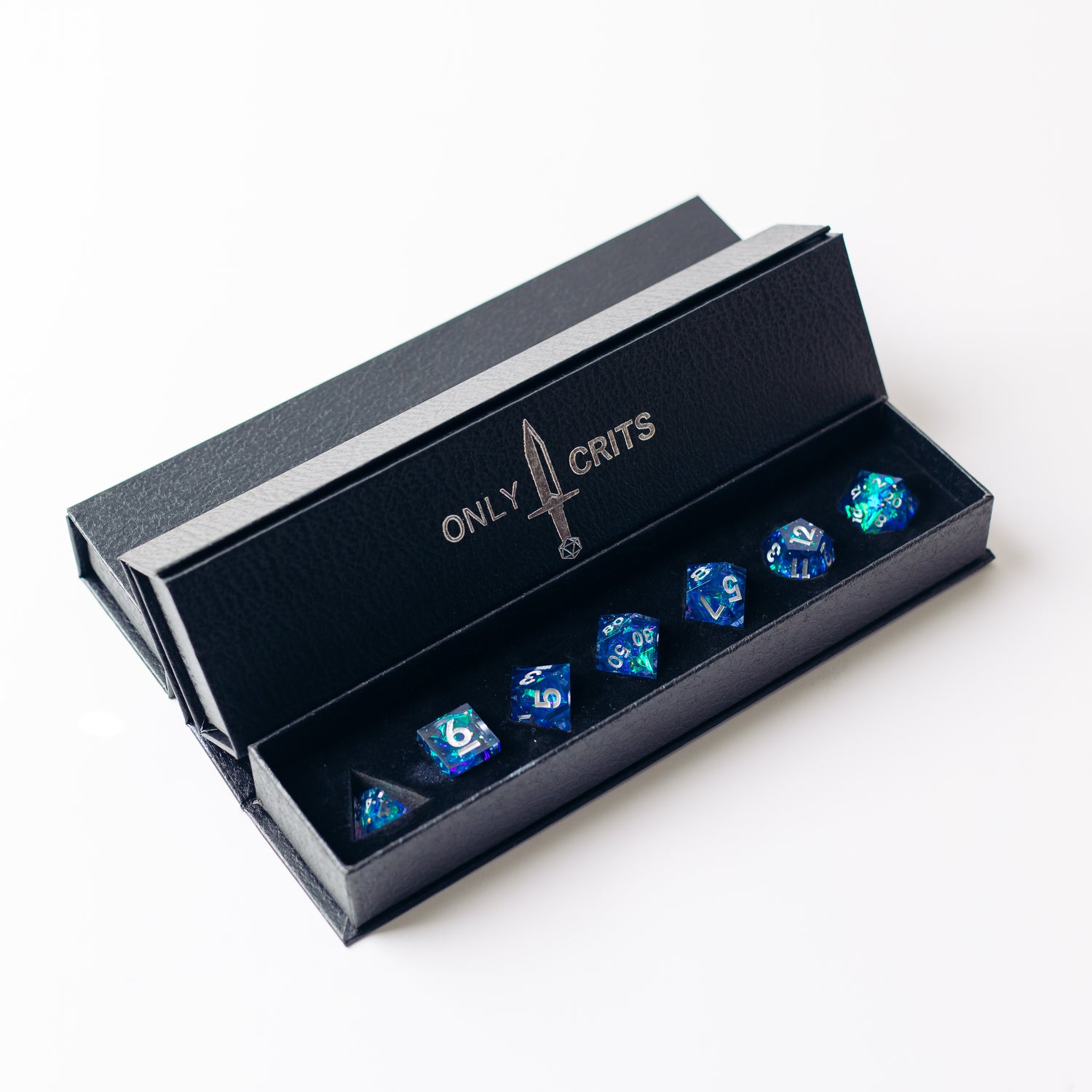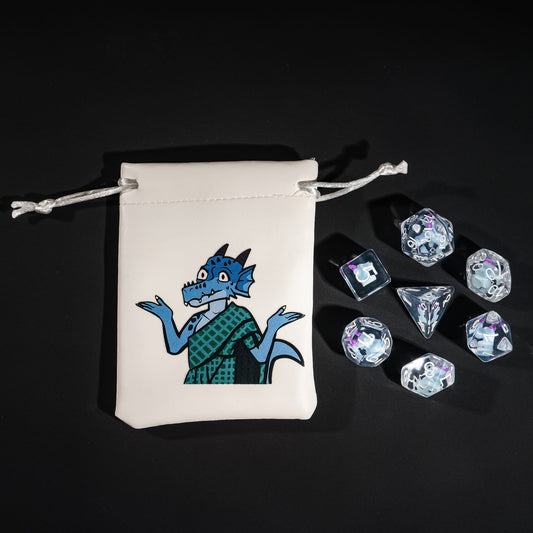It can be very intimidating to take on the role of the Dungeon Master. Being in charge of describing a world, making judgement calls on rules, roleplaying a wide variety of characters, all while trying to keep plot and interactions entertaining and fun is a big job. It requires time, practice, and more than a little patience, but when it all comes together there’s almost nothing as satisfying as a fun session. That doesn’t mean it’s not scary though, no matter how many sessions or campaigns you’ve run you’ll probably have some pre-game jitters, and that’s okay.
We’re here to give you some tips on how to get started, how to mitigate those jitters, what to focus on when getting into DMing, and most importantly how to have fun while doing it.
Read the Basic Rules
Whether you own all the starting books or own none of them, start by reading the free basic rules published by WotC on their website. There’s no way to remember all of the rules and classes and races and abilities and equipment laid out in the Player’s Handbook without dedicating huge amounts of time, but getting a grasp of how the game works can be done in a couple hours with the basic rules. Unless you’re planning on DMing a very experienced party, your players will be looking to you for guidance, and it’s important in those instances not to get caught up in the weeds. Players don’t need to know what an initiative score is if they don’t even realize that combat is turn based, and other nuances like that. Are you a longtime player DMing for the first time? Read them anyways. It’s a good reminder that you have to keep the big picture in mind as well as knowing specific rules, and also not to worry because you have lots of reference material to fall back on. Getting a grasp of the rules goes a long way to settling down and enjoying the story that you get to tell.
Picking or Writing the Story
Dungeons and Dragons is not a wargame, it’s a roleplaying game. There are combat mechanics and very fun combat scenarios, but the game revolves around roleplay, not combat. So, that means you need compelling story hooks, Non-Player Characters (NPCs) and locations. This is perhaps the most difficult part of DMing, since players tend to vary widely in their narrative choices. Where someone would love to track down a killer in a sprawling metropolis, another might wish to quest for a dragon’s gold. The beauty of D&D is that you can change and pivot as you go. But to start out, the story belongs to you, whether it’s been pre-written by someone else or crafted by you, it’s still yours to work with. The more interested you as a DM are in the story, the easier it will be to convey that excitement with the world to your players. If it seems like people want to take it in a different direction that’s fine, but remember this is just as much your game as theirs. If you’ve never played D&D before, we’d recommend trying a pre-written adventure of some kind, whether that’s a one-shot or a longer campaign. They’ll help you get a feel for the rhythm and flow of adventuring in the D&D worlds. If you’re interested in the RPG because it offers you a chance to flex your creative muscles, great! But be sure to utilize resources to make sure your encounters are balanced, as well as other elements of your world blending nicely with the plot.
Role Playing
D&D tends to fall into two categories of gameplay, roleplaying and dice rolling. We refer to dice rolling as anything where you consult rules, set numbers, and have your players roll to succeed. This would include most parts of combat, as well as ability checks and saving throws. The rest of the game is all made up of roleplaying, and RPing is so integral to the game that it’s also woven into dice rolling. A cowardly character will probably value their own life in combat, whether they’re rolling high or not. When starting out it’s very important to engage your players with their characters. It’s okay if they’re playing versions of themselves, often that’s the easiest kind of roleplay, as long as they can buy into the world and their character’s place in it. That leaves you and your roleplaying responsibilities, which take the form of NPCs. It may seem tough to come up with so many characters with names and faces, backstories and lives; but you really only need four things.
1. A physical description. Tall, short, fat, brown hair, beard. It doesn’t have to be complicated, and if this is someone you want the PCs to remember we recommend giving them one interesting feature, for example they’re missing an eye. Or have bright blue hair.
2. A name. This can inform who they are, or they can just be one off strings of vowels and consonants that the players will never see again. There’s fantasy name generators easily accessible online, or just take a name from a side character in Lord of the Rings.
3. A want. This is what this NPC is working towards, be it a nefarious plot to overthrow the government, or they just want to make some money and retire young. Keep in mind you don’t have to map out every NPCs method for achieving this want, that makes moment-to-moment RP hard if your PCs do unexpected things, the want is merely the end goal. A wizard wants a magical artifact, and he’ll slaughter the whole town for it. PCs want to help? Great! They can do that and the wizard will be excited about it, and that’s easy to act out because you know that’s what the wizard wants.
4. A fear. Every positive has a negative, every action has an equal and opposite reaction. The opposite of the want is the fear, the thing that moves an NPC away from something. Again, it can be as simple or existential as you want, but it will help you keep the directionality of your characters clear. That wizard who wants that artifact is scared of spiders? Then he won’t go through the giant spiders lair, which is why he needs the players’ help. A NPC that’s terrified of being alone might cling to the party, an NPC scared of death will beg for its life, knowing what a character doesn’t want will be as informative as knowing what it does. And just like that, role play will be natural and fun.
Running the Game
The reality is that after prepping and creating backstories, or reading up on the pre-written adventure, you still have to run the game. DMing is not reading through a list of events that are going to happen and arriving at a predetermined end-point. Its a series of ever-shifting decisions by both you and your players, so that the end result (which will still be what you want because you are the undeniable god of the table) is a combination of everything that you and your players have put in leading up to it. But that means a lot of little things happen between the beginning of the session and the end. This refers to rule calls, deciding what needs a skill check, descriptions of people and places, description of what happens once a PC passes/fails a check/saving throw. All of that comes from you, which is what makes tabletop RPGs so unique: no two games are ever the same. It’s a beautiful thing, and it all stems from you as the DM. That being said this is the most overwhelming part of running a game, the constant decisions and improvisation, so here are some tips. First and foremost stay calm. It’s obvious and overplayed, but panicking and rushing decisions or roleplay will make the session less fun than taking your time and making the right call. This isn’t a video game where everything happens immediately, so don’t expect to be able to have the perfect answer right away every time. Secondly, mistakes are not a big deal, both yours and players’. If you use the wrong name, who cares? If you got a rule wrong, look it up and clarify it before moving on. If a player rolls a 1 or forgets a plot point, roll with it. Make the mistakes as fun or entertaining as the successes and you can’t lose. This doesn’t mean constantly putting a positive spin on everything, it just means making every action and consequence feel authentic to the world and characters, which is easy once you’ve done the groundwork from previous sections. I will emphasize, don’t be afraid to check the rules, you’re the referee of the world, but this does not mean you make up rules on the fly. That will come back to bite you unless you keep careful track and update them as power shifts with levels and items. Instead, if you’re not sure, check. There are wonderful resources for updating rules if you don’t like RAW, but we suggest doing that well in advance of the session, not in the middle. But above all the most important thing to remember as a DM running a game is Rule 0: The DM is always right. Not the book, not the players, only you. You are the only one that has a proper grasp of the PCs, the rules, and the story, which is why you and you alone are the one who weaves the web of the world.
Lean into Fun
Because of the infinite possibilities that accompany D&D, there are infinite ways to enjoy it, but it’s important to read the room and lean into what people are enjoying. If your party is in love with chatting to shopkeepers, don’t throw them into the wild to hunt for an undead dungeon crawl. If your PCs love killing everything, stick them in a nasty town full of bad people. Because the rules and adventures give you the chance to change and pivot, you can do so to maximize enjoyment. This doesn’t mean don’t challenge your players, just because they enjoy dialogue doesn’t mean they’re automatically great at it, and just because they kill everything doesn’t mean everything wants to be killed. All it means is that you get to pick the direction, and the most natural direction to go is the one that’s the most fun. Most importantly, you are the DM for your players, but you are also a player. Your role is different, but just because you act as the paintbrush of the world doesn’t mean that you’re not allowed to have fun, or that you must adhere to what your players want at all times. Do what’s fun for you too. A happy DM is a happy party, and vice versa.
Dungeons & Dragons is one of the most engaging, challenging and social games that’s widely available and easy to pick up. Whether this is your first time as DM or your hundredth, remember the point is to have fun, and create fun for others. It’s an excuse to step out of reality for a handful of hours, to exist as someone other than yourself, and explore a strange new world. That wonderment that you had as a kid on the playground, swinging sticks like swords and proclaiming your love for make-believe princesses, all of that is possible once again. And the power to make it real is entirely yours.





